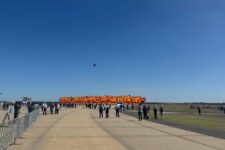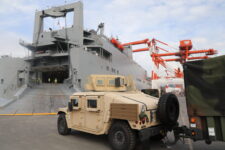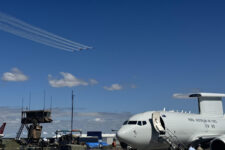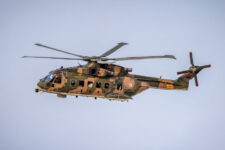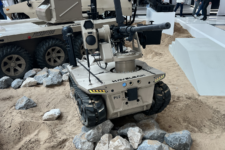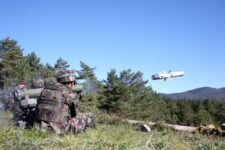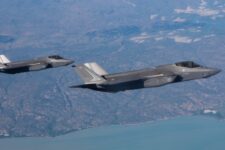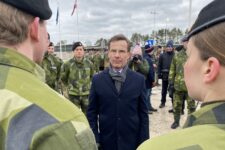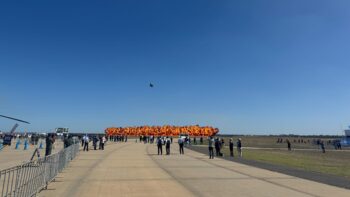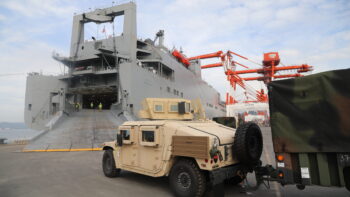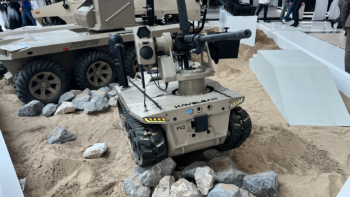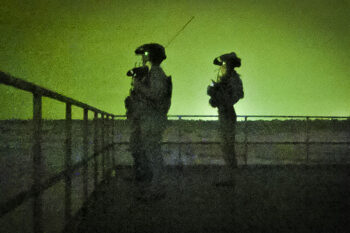
Paul Nakasone, director of the National Security Agency (NSA) listens to a question during a congressional hearing on May 14, 2021 in Washington, DC. (Photo by Anna Moneymaker/Getty Images)
WASHINGTON: Leaders from across the Intelligence Community today discussed their agencies’ priorities and challenges, ranging from Russia to counterterrorism, cybersecurity, and foreign influence operations.
And while they revealed a troubling assessment that al-Qaida could reconstitute itself in Afghanistan in less than a couple of years, still the intel leaders said China was top of mind, as Director of National intelligence Avril Haines put it Monday, along with the best ways to counter America’s largest rival everywhere from the espionage shadows to cyberspace.
“It’s a global competition,” CIA Deputy Director David Cohen told the 2021 Intelligence & National Security Summit today. “One of the things we’re going to do is take a playbook from the agency’s past and deploy assets globally to address China. To do that, we need more people, and we need people [with language skills and specialized training].”
And it won’t be easy, Cohen said, citing the ubiquitous surveillance environment inside mainland China, the challenge of recruiting covert operatives when nearly everyone today has a “digital backstory,” and vetting potential double agents that “China runs at us.”
To the issue of ubiquitous surveillance, Cohen said, “That is not just a China problem. We encounter that in environments all over the world today,” and he expressed confidence in the agency’s ability to get what Defense Intelligence Agency chief Lt. Gen. Scott Berrier called “deep penetration” inside China.
Cohen said his agency is dealing with digital backstories and stringent vetting of potential double agents using technology and human investigation, but he didn’t elaborate on specifics.
Cohen spoke alongside Berrier and other intelligence heavy hitters on a panel for the summit, which was organized by the Armed Forces Communications & Electronics Association (AFCEA) and the Intelligence and National Security Alliance (INSA).
Gen. Paul Nakasone, head of US Cyber Command and the National Security Agency, said his agency is focused on the information domain, noting that online environments today are being exploited by nation-states and non-state actors trying to use information to portray events in a certain way to create “schisms in our society.”
“What’s changed with influence is that there are more actors. It used to be just Russia, but it’s more now. We’re seeing the Chinese in that realm,” Nakasone said, adding that it will be difficult to deter because influence operations are “cheap, easy, and effective.”
His remarks came just a week after US cybersecurity researchers detailed a purported global Chinese influence campaign operating in plain sight online that sought — and reportedly failed — to spark protests over COVID-19 inside the US. Nakasone said today that on the influence front, “The cast of characters is still being developed,” and NSA is watching closely.
Meanwhile, Maj. Gen. Charles Cleveland, a top official at the National Geospatial-Intelligence Agency, said he wants his agency to look at China with the same urgency that the US had for counterterrorism after 9/11.
5 companies, 5 parts: Honeywell pilot seeks to build out AUKUS sub industrial base
“The long-term play for Honeywell is we want to be able to expand our capacity and meet demand with increased and resilient supply chains,” Honeywell executive Lee Davis told Breaking Defense. “The organization sees Australia as a good place to invest in a secure, like-minded nation.”
Afghanistan: Military Intel Assesses a Year or Two for Al-Qaeda to Reconstitute
Still, Nakasone acknowledged that while the IC had “shifted focus” to near-peer competitors like China and Russia, he and his colleagues have not “taken our eye off [counterterrorism].” At the forefront of that discussion: Afghanistan.
Berrier said DIA’s current assessment is, “conservatively, it will take one to two years” for al-Qaida to reconstitute operations that could threaten the homeland from the Southwest Asian country. But, he said, “We’re not going to wait. We’ll look at all kinds of ways to get back into Afghanistan.”
Cohen said CIA is “already beginning to see some of the indications of some potential movement of al-Qaida to Afghanistan,” and it’s an agency priority to “keep a keen watch.”
Following Haines admission Monday that intelligence gathering will be tougher in Afghanistan going forward, Cohen acknowledged the CIA’s “current capabilities in Afghanistan [are] not what [they were] six months ago.”
“That being said, the problem set that we are facing is not one that is new to the community,” he said. “We have experience collecting intelligence in areas that are non-permissive and doing so without a presence on the ground. We will be using those techniques in Afghanistan as we work over the horizon.”
Asked to elaborate on how the agency will do so, Cohen said, “We will look to do everything,” without providing more specifics.
FBI Deputy Director Paul Abbate addressed another concern linked to Afghanistan: the vetting of those coming into the US. He said the bureau is working with partners to screen people, noting “We do utilize a very thorough vetting of persons entering the US. If someone were to get through and get here, then we open an investigation to determine if they do cause a threat and how to neutralize that threat.”
FBI: Domestic Terror Equal Priority to International Terror
Abbate pivoted to another point of concern, emanating not from Southwest Asia, but from America’s backyard.
Abbate said there’s a “wide spectrum of ideological motivations” that drive domestic terrorists. He said the FBI does not have any “specific, credible information about violence that may occur” at a political rally planned in the capital on Sept. 18 in support of Jan. 6 protestors now being detained.
Abbate said counterterrorism is the FBI’s “number one priority.”
“It’s at the top of our threat rankings. We put international and domestic terrorism equally at the top,” he said.
In Cyberspace, Russia Declines to Take Action on Ransomware
Cyber, however, also remains a top priority for the bureau, Abbate said.
In the wake of a string of devastating ransomware attacks, Abbate said that, based on what the FBI has seen, “There is no evidence to suggest Russia is cracking down on ransomware operators [inside Russia]. We’ve seen no action. I’d say nothing has changed.”
Dodging a contentious debate, Abbate also said it’s “not the FBI’s place” to determine policy around ransomware payments.
Nakasone said cybersecurity is, of course, a focus for NSA. “Cybersecurity is national security,” he said, noting that “cyber leads to a new environment of competition” where “adversaries are operating below the threshold of armed conflict,” a concept often referred to as the gray zone.
“[NSA is] truly an agency of data, particularly for our cryptographic” capabilities to break codes, which he said the agency is using “high-powered computers” to do.
When it comes to countering adversaries, perhaps like Russia or China, in cyberspace, Nakasone said it’s the president who makes that call. “We will provide a number of different options,” he said, declining to elaborate.
The wide-ranging discussion touched on a number of other areas, including space security, innovation, emerging technologies, and the agencies’ recruitment efforts, but one of the more interesting exchanges came when Cohen was asked for an update on the CIA’s investigation into so-called “Havana Syndrome.”
“We’ve gotten closer,” he said, but “not close enough to make the kind of judgment that people want. We’ll get there. I can’t tell you whether it will be tomorrow, next week, or six months from now. But every piece of intelligence we collect on this helps build out the picture.”

